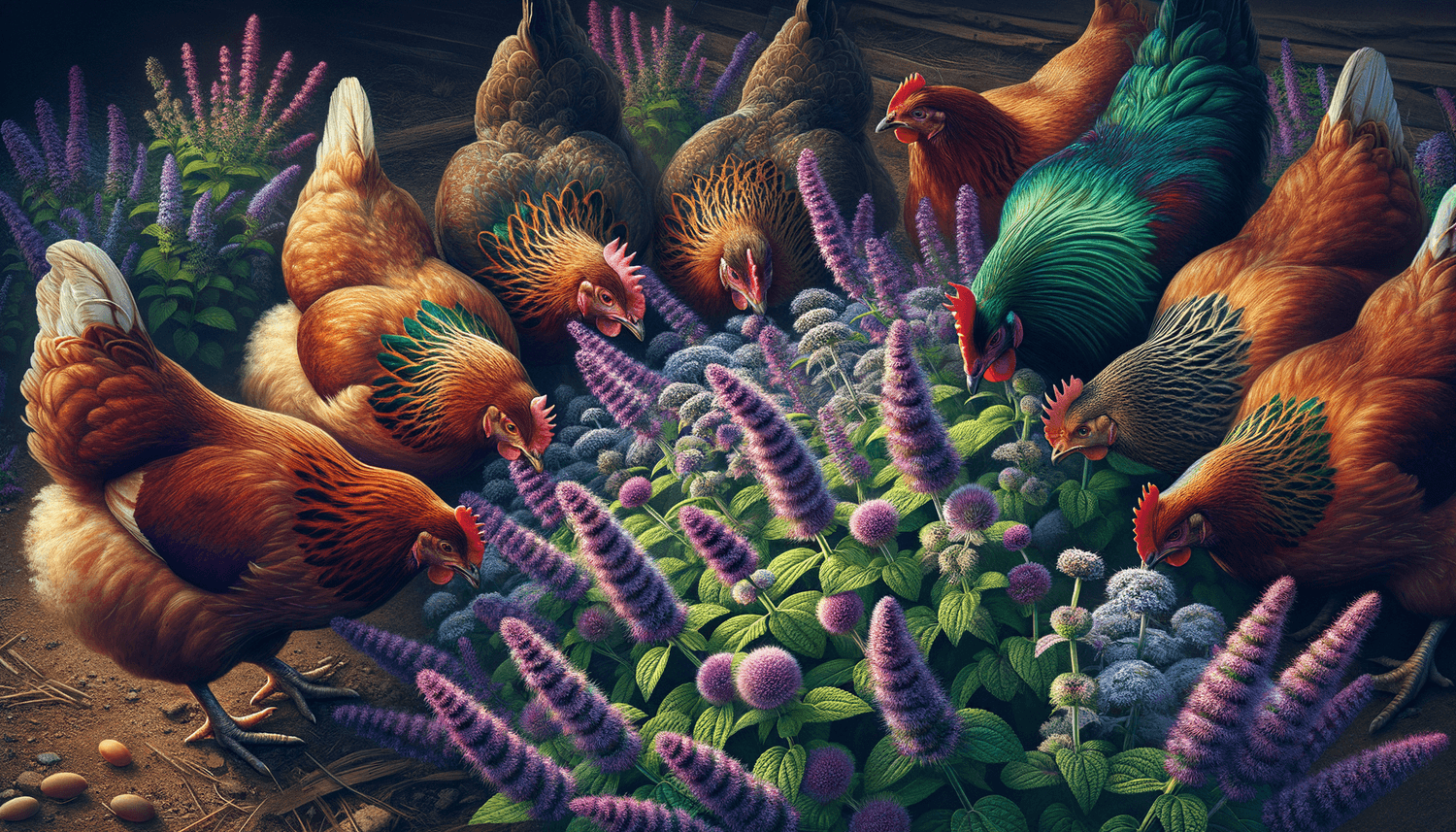Cluck! Cluck! Gather ’round, fellow chicken enthusiasts, as we dig into the tasty topic of whether our feathered friends can gobble up some scrumptious catmint! In today’s blog post, we’ll hatch a plan to uncover if chickens can really dine on this feline favorite, peck through the importance of a well-balanced diet, and discuss the potential benefits and/or risks that come along with it. Of course, we wouldn’t leave you egg-specting more, so we’ll also scratch up some noteworthy nutritional info and share tips on preparing this piquant, purple-flowered plant for your clucking clique!
Can chickens eat catmint?
Yes, chickens can safely eat catmint! Catmint is a non-toxic plant and poses no harm to your chickens when consumed in moderation. Chickens may even enjoy pecking at the flavorful leaves and flowers, making it a fun and healthy treat to include in their diet.
A balanced diet for happy hens
Just like us humans, our feathery friends also need a well-rounded, balanced diet to maintain optimal health and happiness. A proper diet ensures that they can lay delicious, nutritious eggs and enjoy a high quality of life.
The foundation of any good chicken meal plan should be high-quality chicken feed, which should make up around 80-90% of their diet. Chicken feed is specifically formulated to provide all of the essential nutrients, vitamins, and minerals your flock needs to thrive. This core component of their diet allows them to grow strong, avoid diseases, lay quality eggs, and live their best clucking lives!
As for the remaining 10-20% of their diet? Just like humans, chickens enjoy the occasional treat, too! You can offer them a variety of fruits, vegetables, and other nutritious tidbits that supplement their primary chicken feed intake. Offering a diverse array of treats helps keep things interesting for your flock and provides additional health benefits.
Nutritional value of catmint for chickens.
Feeding catmint to your chickens not only offers a fun and interesting treat but also provides some nutritional benefits. Catmint contains a range of vitamins and minerals that can contribute to your chickens’ health. For instance, catmint is rich in vitamin A and beta carotene, which are essential for eye health and can help support a robust immune system.
In addition to vitamins, catmint contains trace minerals like potassium, phosphorus, and calcium, which play critical roles in various bodily functions. Calcium, for example, is particularly important for laying hens, as it helps produce strong eggshells.
Another advantage of catmint is its high moisture content, which keeps your chickens hydrated, particularly on hot days. Hydration is crucial for chickens’ overall health and can help with digestion and egg production. Furthermore, catmint has natural insect-repelling properties and can act as a deterrent for pests such as mites or lice in the coop.
While catmint may not be the most nutrient-dense treat out there, it still offers some health benefits that can complement a well-rounded chicken diet. Remember to provide catmint in moderation, along with other treats and a consistent supply of high-quality chicken feed, to ensure your flock receives a balanced and varied diet.
Nutrition table of catmint for chickens.
| Information | Description |
|---|---|
| Nutritional Value | Contains vitamins A and beta carotene, as well as minerals like potassium, phosphorus, and calcium. |
| Suggested Serving Size | Feed in moderation, along with other treats and a consistent supply of high-quality chicken feed. |
| Safe Feeding Practices | Ensure catmint is pesticide-free, and avoid giving chickens catmint that has been exposed to cat saliva or any other form of contamination. |
| Preparation | Wash the catmint thoroughly and serve fresh. Can be provided in small amounts mixed in with other vegetables or fruits. |
| Potential Risks | None when consumed in moderation, but it’s essential to maintain a balanced diet with other treats and chicken feed. |
| Hydration | Catmint has high moisture content, which keeps your chickens hydrated, especially on hot days. |
| Digestion | Feeding catmint is not known to cause any digestive issues for chickens when consumed in moderation. |
| Seasonal Availability | Catmint is most readily available during the spring, but it can grow well throughout the summer and into the fall. |
| Other Benefits | Catmint has natural insect-repelling properties and can help deter pests like mites and lice in the coop. |
Consider Growing Catmint in Your Garden
If you’re a gardening enthusiast, consider growing catmint in your garden. Not only is the plant beneficial for your chickens, but it’s also a delightful addition to any backyard space. Catmint is drought-resistant, easy to grow, and, as an added bonus, the clusters of lavender-blue flowers offer a stunning aesthetic appeal. Growing catmint also attracts pollinators like bees and butterflies, enhancing the overall biodiversity of your garden.
Treat Ideas: Mixing Catmint with Other Goodies
For a real poultry party, consider combining catmint with a few other wholesome treat options when feeding your flock. You can mix catmint leaves and flowers with a variety of fruits or veggies, such as spinach, peas, chopped fruits like apples or berries, and even crushed eggshells for an extra calcium boost. This medley of treats will keep your chickens excited for their next helping and ensures they receive a well-rounded variety of nutrients.
Summary
In conclusion, catmint is a safe and enjoyable treat you can offer your chickens. It provides nutritional benefits, including vitamins, minerals, and hydration while also serving as an insect repellent. Be sure to maintain a balanced diet with a primary focus on high-quality chicken feed, and offer catmint and other treats in moderation to keep your backyard flock healthy and content.

















